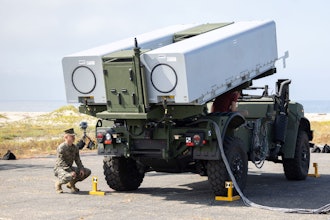ST. LOUIS (AP) — Boeing Co.'s loss of a $40 billion Air Force tanker contract last week highlights the aerospace company's changing relationship with the U.S. Air Force, experts said.
The stunning loss resulted in part from the fallout of a procurement scandal that scuttled Boeing's last tanker deal, the St. Louis Post-Dispatch reported Sunday.
Four years ago, the Chicago-based company lost a contract to lease 100 tankers to the Air Force after an investigation led to charges of illegal dealings between a top executive and a chief Air Force weapons buyer, putting both in prison. It was a black eye for Boeing and led to a hefty $615 million settlement. It also changed the dynamic between Boeing and the world's biggest buyer of military planes.
''There has been a gulf between Boeing and its Air Force customer ever since the procurement scandal,'' said Loren Thompson, a defense analyst with the Virginia-based Lexington Institute. ''That has made it hard for Boeing to understand its customer the way it once did.''
Air Force officials wouldn't specify Friday why they chose Los Angeles-based Northrop Grumman and European Aeronautic Defence and Space Co., the maker of Airbus planes, though they indicated the KC-30 was the superior tanker in several key areas.
The biggest reason, according to Gen. Arthur Lichte, commander of the Air Mobility Command at Scott Air Force Base, was Northrop's tanker's size. Boeing offered a smaller 767-200, which it planned to build in Everett, Wash., but the Air Force wanted a bigger tanker, capable of hauling more cargo and people, in addition to fuel. The KC-30 fit the bill.
That misjudgment is a troubling sign for Boeing, Thompson said.
''This is such a stunning upset,'' he said. ''It shows something fundamental has gone wrong (in the relationship) with their biggest military customer.''
Although Sue Payton, who oversaw the purchase for the Air Force, said there was no residual bias left over from the scandal, many observers say it did lead the Air Force to conduct an especially rigorous contracting process this time around.
Boeing's loss increases the pressure to keep its other military plane projects viable, said Richard Aboulafia, an aerospace analyst with the Teal Group in Fairfax, Va.
Boeing's military plane-making programs generate good cash flow, but many are on their last legs.
''Their platforms are under pressure,'' he said. ''In five years, the C-17, the F-15, the F/A-18, the T-45, they're all going to be either ramping down or gone.''
Boeing still has strong helicopter programs and growing work on network projects such as Future Combat Systems, but its traditional strength in making military planes could erode if it doesn't win new contracts, experts say.
Still, the tanker deal was just a small piece of the company's overall picture, said Scott Hamilton, an aerospace analyst in Washington state. Boeing had $66 billion in revenue last year, split evenly between its defense and commercial divisions. It can absorb the loss of 12 or 18 planes a year.
''Boeing is going to survive,'' he said.






















